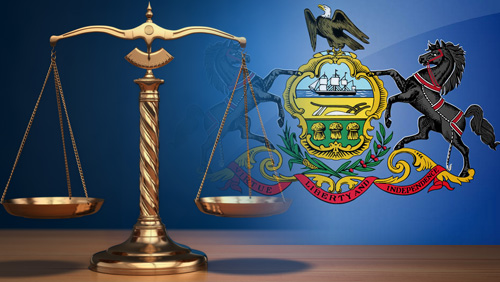The gambling industry in Pennsylvania is in a state of chaos after the Supreme Court voted 6-1 in favour of an extension for the General Assembly to change tax laws on slot machine revenue as local communities suffer.
The Pennsylvania Supreme Court has granted the General Assembly more time to pull their fingers out of their ass and come up with a solution to their slot machine tax levy headache.
In 2006, Senate Bill 862 passed with flying colours dictating that the 12 casinos in the state would have to pay a tax levy of 2% of annual gross slot revenue or $10m (whichever came first). And that deal has stood for the past decade until recent rumblings.
The first to complain about the tax levy, a dec ade after the imposition, was Pittsburgh’s Rivers Casino, where four of the world’s top No-Limit Hold’em Heads-Up specialists are currently being handed their ass on a plate by a machine.
ade after the imposition, was Pittsburgh’s Rivers Casino, where four of the world’s top No-Limit Hold’em Heads-Up specialists are currently being handed their ass on a plate by a machine.
A legal team representing Rivers Casino argued that the levy was unfair because all 12 casinos earned vastly differing slot revenue. The casino dropped the baton in June 2016, and it was picked up by Mount Airy {I desperately want to write Fairy, here} Casino Resort who tried the same argument. The Supreme Court agreed with the Casino and gave the General Assembly until January 26, 2017, to come up with a fairer system.
With the change date coming up on the horizon, the General Assembly went all Chairman of the Board.
Give me just a little more time.
The Supremes in the Court ruled 6-1 for an extension until May 26 with the only dissenter, Justice David Wecht, saying “Stalled in a political traffic jam of their own making, the legislators ask this Court to build them a detour. We should decline to do so.”
The Community Suffers; Casinos to the Rescue
The lack of decision-making by the General Assembly creates a conundrum. The Supreme Court has ruled that the law is a pile of pants, and therefore the casinos don’t have to pay up. The losers are the communities that have been receiving these funds for the past decade. Fortunately, the casinos have big hearts – and deep pockets – because some of them have continued to pay their monthly taxes to support the local community until the politicians find a resolution.
Not a single casino has ever earned the $500,000 in annual gross slot revenue needed to reach the $10m ceiling. Last year, Sands Bethlehem performed the most heroicly when it came to slot income, and they only hauled in $288.9m, meaning they had to make up the shortfall.
The Mount Airy Casino Resort’s 1,850 slot machines only dragged in $139.1m, meaning a shortfall of $7.22m. The Casino has handed over more than $800m in taxes since the law came into force.